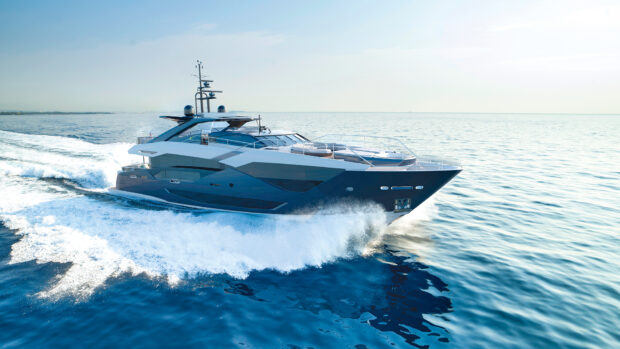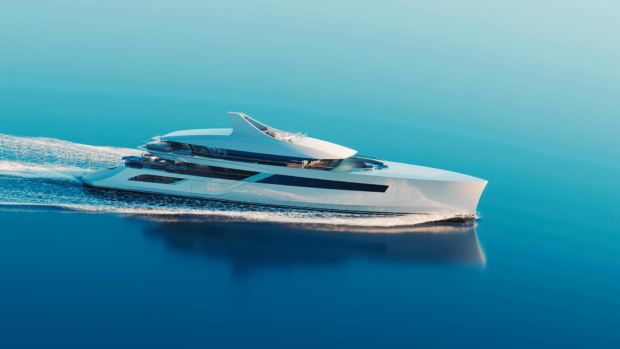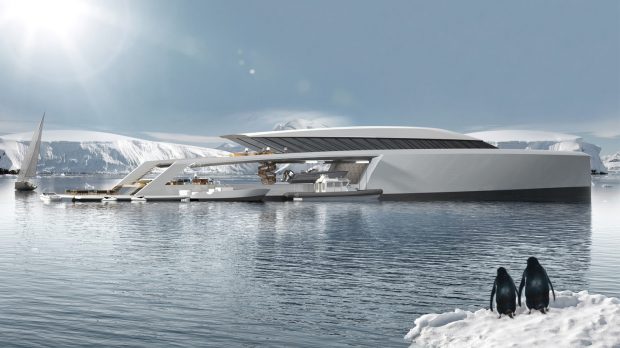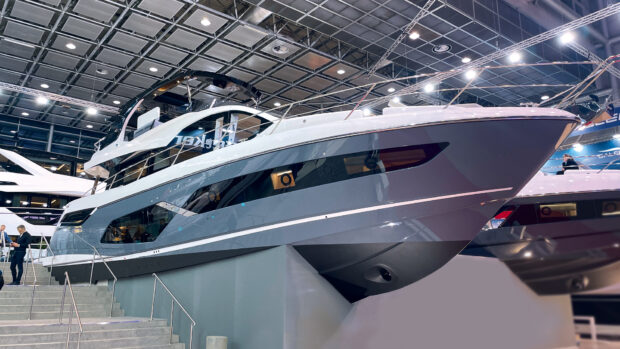What turns a superyacht into a thing of beauty? We asked scores of the world's leading yacht designers to list the 10 most beautiful superyachts ever built...
The only rules were that they couldn’t pick one of their own and they had to be luxury superyachts over 30 metres. With the votes counted, we can now reveal our definitive rundown of the most beautiful yachts in the world.
We’ve even enlisted some of those same designers to explain what makes the final ten yachts so special. Scroll down to see the full top 10 and read more about each model.
10 of the most beautiful superyachts of all time

10. Limitless
James Roy, managing director of BMT Nigel Gee believes her to be one of the most beautiful superyachts in the world and writes:
“One of the earlier breed of superyachts Limitless is in my opinion from a period when the volume of superstructures were not over imposing producing a well balanced yacht. These proportions coupled with the sheer line and well matched angles of bow profile and rake of superstructure ends all work together.”
Certainly with her dark blue hull and glistening white superstructure she cuts quite a dash and at night her comprehensive array of on deck illumination and underwater lighting make her look nothing short of spectacular proving that yachts can have beauty 24 hours a day.
Year: 1997 – LOA: 96.25m – Builder: Lürssen – Exterior: Jon Bannenburg – Interior: Catroux
Article continues below…

Oceanfast 164 superyacht tour: Inside an incredible Bannenberg/Cavalli masterpiece

Rossinavi 50m superyacht tour: Inside a one-of-a-kind Italian superyacht

9. Skat
“It’s a great pleasure to pay tribute to an iconic thoroughbred such as Skat, still standing tall on the horizon,” says Tim Saunders of Rainsford Saunders Design. “Despite her military looks, this is a true superyacht, engineered as a ship at heart and built from the keel up, with every square metre fulfilling the owner’s brief. Skat is a unique design but has not broken traditional yachting rules for the sake of it.
She is a superyacht that has been devised to offer the owner a well-considered relationship between external and internal living spaces, and unlike many of her sisters, she doesn’t opt for maximum density. Skat’s combination of poise, elegance and balance comes from a clever use of straight, angular lines, facetted surfaces and enhanced ship details.
Each component comes together in a harmonious relationship to offer a daring and bold statement that from a distance has the grace and elegance of something far more organic. She is a yacht that catches your eye from all angles.”
Year: 2002 – LOA: 70.7m – Builder: Lürssen – Exterior: Espin Oeino – Interior: Marco Zanini

8. Alfa Nero
“When we first saw Alfa Nero we were impressed by her smooth exterior lines,” say Mareid Moosbrugger and Georg Decker of Egg and Dart Design. “The superstructure is sleek and elegant without any angular or hard corners. We consider her to be one of the most beautiful yachts afloat today, and we can easily understand why our colleagues agree.
“Walking around her at the 2007 Monaco Yacht Show, we felt the three-dimensional use of space was harmonious with the elements, and there was a true balance between the inside and outside areas of the yacht, with the exterior spaces maintaining a close connection with the natural environment of the sea and sky.
“The decks are open and airy, yet there is a feeling of being safely cocooned, and the superb aft deck in particular maintains a feeling of being at one with the ocean, which is emphasised by the huge pool. The yacht impressed us as a gentle giant: on the one hand huge, voluminous and technically advanced; on the other, stylish, glossy and surprisingly cosy.
“The beautiful interior features a timeless but modern design with elements of Art Deco, and everywhere you can see that the smallest details have been attended to. This yacht is a perfect combination of design, functionality and vision, and offers a unique ambience.”
Year: 2007 – LOA: 81.27m – Builder: Oceanco – Exterior: Nuvolari-Lenard – Interior: Alberto Pinto

7. Aviva
Designer Reymond Langton says: “At the time of her creation, she was the largest yacht that we had signed and would be the largest the yard had built. The client is a very experienced yacht owner and for him to have put his trust in us when we had nothing of our own in the water at the time was a massive vote of confidence.
“He allowed us to be a little experimental with the design – this was the first large yacht with a plumb bow. It was fantastic to have landed another contract where we were able to design the exterior and interior as it gave us much more control over the whole project, and gave us the scope to really harmonise the spaces.
“It also allowed us to work hand in hand together, which we thoroughly enjoy and believe delivers the best results for the client. We think she stands out because she has a very striking profile that is easily recognisable from a distance.
“She has a lot of presence on the water due to her powerful lines. Anyone who has been on board will tell you that the high-volume interior feels incredibly luxurious.”
Year: 2007 – LOA: 68.0m – Builder: Abeking & Rasmussen – Exterior: Reymond Langton Design – Interior: Reymond Langton Design

6. Carinthia VII
The Austrian supermarket heiress Heidi Horten replaced Carinthia VI (see below) with this very secret yacht rumoured to run at 26 knots. Voting her as his most beautiful yacht, Rupert Mann of Rainsford Mann Design said, “97m is a good length for a designer to work with, as it gives an opportunity to design longitudinally not vertically and therefore create an elegant yacht which appears low and sleek.
“What makes the design of Carinthia VII so successful is the enhancement of this due to the pure and elegant sheer line that draws your eye from the bow to stern so effortlessly. The clever trick of dropping the sheer line one deck down aft, gives it a dynamic and purposeful bow shape forward, as if carving its path with consummate ease.
The horizontal lines of the super structure are equally uncomplicated, in this instance resisting the addition of unnecessary detail such as fashion plates that often complicate a design. Ultimately I think the strength of the design manifests through its simplicity. It is the most successful of designs, which can be called a ‘timeless classic’.
“A design that will be successful in every genre modern or classic and in every decade, that even 7 years later still is relevant and pleasing to the eye. I would suspect it is this timeless styling and the sheer simplicity, coupled with the poise and balance of the whole composition, that is so appealing to so many of us.”
Year: 2002 – LOA: 97m – Builder: Lürssen – Exterior: Tim Heywood – Interior: Tim Heywood

5. Maltese Falcon
The designer Ken Freivoch, responsible for the way this beautiful yacht looks says, “We are delighted that our fellow designers should have included Maltese Falcon within their shortlist. She was designed without any attempt to be ostentatious or to conform to a set style – it was very much a case of “form follows function”, albeit with very careful attention to essential design principles, balanced proportions and uncluttered and purposeful shapes totally derived from the function they are designed to perform.
The yacht is significant in her innovative sailing system, and our studio took this as a clue to develop the design around such technology, with every effort to develop beautiful and unique solutions aimed at highlighting her unique rig. I can only surmise that a reason why she may have been selected by designers is that she is not a “trendy” design, but the result of going back to first principles, coming out with original and unique solutions, and achieve continuity of concept through from the external styling to the interior design.
A case in point would be the design of the “spider” feature at the aft deck – originally the result of a last minute request from the naval architects to achieve optimum separation between the bearings at the mizzen mast, the announcement from Gerry Dijkstra came something like: “Hey Ken, if we had to place the top bearing for the aft mast 1m above the deck, in the middle of the aft deck – would that be a problem?
“Can you come up with a way to do this, which Tom will not object to? We took this as a clue to design an elegant and purposeful set of arches or buttresses to shore up the bearing in question, and at the same time underline what a unique “machine” the Falcon is – express such function very much along the lines of a watchmaker showing the inner workings of a beautifully crafted watch. Maltese Falcon was a great challenge, exactly the type of challenge that our design team relishes.
For us, the thrill, the excitement and the ultimate satisfaction is to come up with totally unique, “out-of-the-box” solutions, and achieve a design which the owner can feel was truly conceived and executed in response to his brief, to his preferences and to the very specific requirements set out for the project.”
Year: 2006 – LOA: 88m – Builder: Perini Navi – Exterior: Gerard Dijstra – Interior: Ken Freivoch

4. Enigma
Espen Oenio was at the time of the design working with Martin Francis and describes the commissioning owner – Mexican media magnate Emilio Azcarraga – as a wonderfully charismatic man. He remembers one meeting in particular early on in the project.
They were at the time sitting on board the owner’s then yacht Lady Azteca (now Achilles), when he laid out what was to become the mission statement for the whole design process. He told the design team: “I am a very private man. I never spend time in port, I am always cruising. But when I do go into port, I want my presence to be felt through my boat.”
James Roy of BMT Nigel Gee is one designer who voted for Enigma. “It was not until I set eyes on her in the flesh at Cowes Week in 1999 that I really came to appreciate her beauty,” he says.
“The reverse sheer, the sweeping aft deck and those iconic windows – they all meld together to produce a yacht that visually works to perfection and is thoroughly striking even today, 18 years after her launch. It’s very different from anything else that is around.”
Theo Werner of Werner Yacht Design is equally enthusiastic. “When the design of this yacht was first published, I was stunned,” he says. “And when the first photographs appeared in the magazines, I was even more stunned.
“She introduced a new way of thinking that even surpassed the designs of Bannenberg, who I admire very much. Eco included many aspects that are foreign to other ships and yachts, yet Martin Francis managed to combine these with everything that make a ship pretty, such as sleekness, the suggestion of a low freeboard a small superstructure.”
She was subsequently sold to Larry Ellison and is now owned by the British businessman Aidan Barclay and his brother.
Year: 1991 – LOA: 74.5m – Builder: Blomhm & Voss – Exterior: Martin Francis – Interior: Francois Zuretti

3. Endeavour
“Endeavour is one of my favourite yachts for a number of reasons,” Ed Dubois told SuperYacht World. “Firstly, she is a J Class yacht – one of only a few ever built. This class epitomised the very peak of yacht design before World War II and remains still, in technical terms, a class apart. These yachts were extreme in every way and demanded technology that was then in its infancy.
“They were superb yachts to sail upwind, but they were also fast reaching and downwind. They demanded a very high level of sailing skill, and indeed a high level of boatbuilding skill.
“Endeavour, I believe, is the most beautiful of all the Js built. Her purity of line is exquisite and I think the shape of the sheer is slightly better than any of the others including Velsheda (by the same designer).
“Charles Nicholson designed Endeavour in 1933 and she was used to challenge for the America’s Cup in 1934. It was universally acknowledged that she was faster than the defender Rainbow, and she won the first two races, but better sailing by the Americans allowed them to win overall.
“She has captured the imagination of so many people including, happily, Elizabeth Meyer, who acquired the yacht in the seventies and rebuilt her almost from scratch.
“I believe there is some original plate still present but the hull was rebuilt in the UK and then taken to Royal Huisman Shipyard to be fitted out. The interior, by John Munford, is beautiful – obviously not what was fitted originally when she was a pure racing yacht, but Munford created something that is entirely fitting.
“Endeavour is not a practical yacht to own. She can only be sailed in reasonable conditions, she requires a large crew to race her, most of whom by necessity must sleep ashore, and maintaining a yacht of this type, particularly with regard to sails, rigging, etc is not inexpensive. However, for sheer sailing performance, romantic appeal and beauty I believe she is second to none.”
Year: 1934 – LOA: 39.6m – Builder: Camper & Nicholson – Exterior: C & N – Interior: C & N

2. Pelorus
Designer Tim Heywood says: “When a client gives you carte blanche to create a design, it is a blessing and a curse, if you do not rise to the challenge, you will not gain the approval of your client or, eventually, the respect of your peers.
“Pelorus was a great project for us and we are extremely pleased with the end result, as was the client. I was able to develop the internal general arrangement plan, the external global styling themes and the practical engineering details to a level I had not achieved before.
The organic curves & forms of the superstructure are echoed in the lines of the hull, tying the two forms together, to produce a harmony that is easy on the eye, was quite unique at the time and, hopefully, will not date.
“The belt line that runs forward from the stern and sweeps down towards the anchor pocket, is inspired by the armour plating of the light cruiser HMS Belfast, which still lives just up stream from our old London studio.
“If I succeeded in creating a yacht that is thought of as attractive, by my brothers in arms of the design world, I am very pleased. Informed comments from professional, talented designers and client, means more than from any other source, especially if they are not negative!
“My partner, Vanessa, came up with our project name, we always give a name to our yachts, rather than a sterile number, and the client liked the name so much that he confirmed Pelorus as the yacht’s eventual name. The yacht has changed hands, but we are very pleased to see that she has retained her original name.”
“If I succeeded in creating a yacht that is thought of as attractive by my brothers-in-arms of the design world, I am very pleased. Informed comment from professional, talented designers and clients means more than from any other source – especially when they are positive!”
Year: 2003 – LOA: 115m – Builder: Lürssen – Exterior: Tim Heywood – Interior: Terrence Disdale

1. Carinthia VI
Dickie Bannenburg of Bannenburg Designs say: “Famously, and perhaps notoriously, Carinthia VI owes her existence to the fact that her elder sibling Carinthia V survived for only a few months before ending her days several fathoms down in Greek waters.
:The unfortunate captain struggled ashore to find a phone to have an awkward phone conversation with Helmut Horten, his Owner. Mr Horten rang my father up almost the following day and told him to start work on her replacement which has now become, in an often over used phrase, a yachting icon.
“She certainly wasn’t an icon when she appeared out of the Lürssen shed for the first time. With dramatic superstructure on a slim frigate-based hull, grilles and that distinctive blue windshield forward of the wheelhouse, my father’s design scared the pants off people and the perception of him hardened amongst conventional designers and naval architects as a dangerous radical. But now her pared down lines and slender masculinity scream good taste, restraint and a sense of suave style that is rarely seen these days.
“Certainly her interior was purposeful, code for slightly austere, and by today’s standards there was not much interior volume for lavish living, not least due to the presence of three mighty MTU diesels. There are no swoops, no complicated fashion plates and absolutely no ability to walk down steps at the transom to a nice bathing platform.
“But all the better for it. Life on board was, I understand, conducted with a certain Austrian precision and Carinthia’s elegant and taut exterior, with deep blue paintwork and her gold coachwork stripe cut an unmistakeable dash in the harbours of the Cote d’Azur as she still does today.
“My father was very proud of her. Of course I’m even more proud that his design of almost forty years ago has such an enduring impact.”
Year: 2003 – LOA: 115m – Builder: Lürssen – Exterior: Bannenberg – Interior: Bannenberg
First published in the January 2015 issue of Superyacht World.









